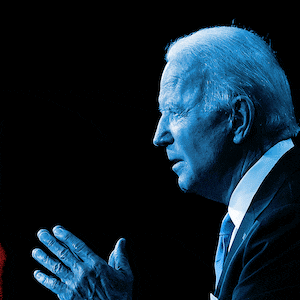It feels like 2009 all over again. One of Barack Obama’s first moves as president was to summon congressional leaders to the White House in January of 2009 to discuss the economic stimulus package. When John McCain—the former P.O.W. and respected statesman he had just defeated—voiced concerns that the spending was too high, Obama chastised him, saying, “I won.”
A dozen years later, Joe Biden hosted a much more cordial conclave when Republicans traipsed to the White House Monday evening to discuss their smaller, $600 billion, counterproposal to his COVID relief package. But will Biden’s actions be any different from Obama’s? “It was an excellent meeting and we’re very appreciative that as his first official meeting in the Oval Office the president chose to spend so much time with us in a frank and very useful discussion,” Republican Sen. Susan Collins said after the meeting. But she also hastened to add, “I wouldn't say that we came together on a package tonight.”
That might be an understatement. Friendly meetings are nice, but Biden faces a tough choice that could set the tone for the next four years—and it looks like he’s going to do the wrong thing and give in to mounting pressure from Democrats to tell Republicans “to go stuff it and pass the full $1.9 trillion through reconciliation.”
In a statement on the meeting, White House Press Secretary Jen Psaki praised the “substantive and productive discussion,” but seemed to pull the rug out from under Republicans’ hopes for much compromise. Biden “is hopeful that the Rescue Plan can pass with bipartisan support,” the statement says, before concluding that “a reconciliation package is a path to achieve that end.”
In other words, Biden wants bipartisan support, but not bipartisan compromise (at least, not much) because, after all, his plan “was carefully designed to meet the stakes of this moment.”
This is a nice way of telling Republicans, “I won.”
Unless he reverses course, Biden will have, in less than one month, surrendered the central theme of his campaign and (in my opinion) his raison d'être. Abandoning this promise to unite the country and its political actors would be tantamount to a bait-and-switch. Biden’s brand would be undermined, and he would be less likely to garner any future bipartisan cooperation—something he may need with a 50-50 U.S. Senate.
What is more, this choice would further erode the public’s trust in political leaders. Not counting the Trump interregnum (where the pretense of being everyone’s president was abandoned), Biden would be the third consecutive president who came to office vowing to be “a uniter, not a divider,” only to cave and pursue a strategy playing to his base.
The problem is, Biden is making a false choice between working across the aisle and effectively addressing COVID relief. Nobody really knows what amount of money would sufficiently address the crisis, and everyone is placing their bets, in part, based on how things played out in 2009, when Obama believed he ended up paying too big a political price for what turned out to be too small a relief package.
Now, progressives are guesstimating that $1.9 trillion is the magic number and that the $600 billion in the GOP’s more targeted plan would be insufficient. In advance of Monday’s meeting, Psaki telegraphed Biden’s position, saying, “The risk is not that it is too big, this package, the risk is that it is too small.”
Part of the story here is that people’s priors are based on questionable premises. In the wake of Trump’s chaotic and toxic presidency, it has become fashionable revisionist history to imagine that Republicans were solely to blame for failing to compromise with Obama, that they were never sincere about wanting to work with him, and that Obama’s naive attempts to compromise prevented him from getting more done. If one accepts this premise, then today’s solution is obvious: Biden shouldn’t waste his time trying because it will just be another example of Lucy pulling the football away from Charlie Brown.
The truth, however, is more complicated. Isn’t it always? First, the “Lucy” in this scenario is Susan Collins—the same person who just helped spearhead the $900 billion bipartisan deal that passed just over a month ago. By the way, 92 U.S. Senators supported that bill—which suggests to me that it’s premature to advance the (cynical) notion that Republicans are merely playing a cat-and-mouse game.
Second, as liberal writer Bill Scher has pointed out, Republicans actually ended up supporting a lot of Obama’s agenda.
What should give us some hope is that Joe Biden has a track record of working across the aisle. After that infamous January 2009 White House meeting, Biden reportedly told Rep. Eric Cantor, “You know if I were doing this, I’d do it totally different.”
Well, now, he is doing this. But will it turn out any different?
The American public has given Joe Biden a mandate to repair our social fabric and to address the global pandemic and the concomitant economic fallout. If he can make progress toward doing both things, history will judge him as one of the greats. But this can only happen if he resists the partisan temptations that have seduced every president in this century.
Instead, Biden seems likely to choose the alternative: to cave to peer pressure and do what everyone else does—be a politician like all the rest. At least he made it out of January.



